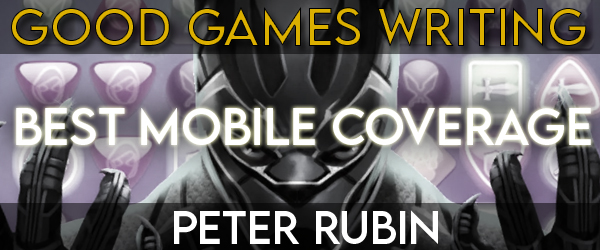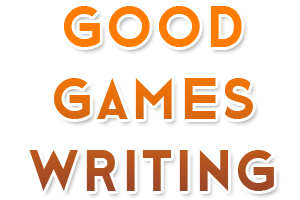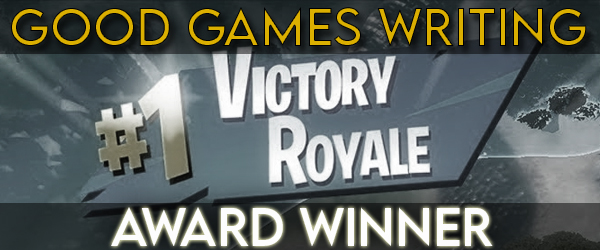It’s a new day for #TheGoodies2020 and a new batch of awards. This is a celebration and we’re here to have fun, share some amazing works, and revisit great pieces from the past year. Here goes…
TABLETOP
A discussion on good games writing isn’t complete without considering tabletop writing. The worlds found in these games, along with their sundry mechanics, leave an indelible mark on gaming at large. We don’t read as much tabletop writing as we’d like but we are happy to see it becoming a topic covered by various sites, in gaming and beyond, and these nominees reflect that placement.
At Vox, we see this in their Halloween/Witch event coverage, as Emily VanDerWerff tackles Great American Witch RPG. It’s a strong piece that’s accessible to tabletop aficionados and newcomers alike; it tackles topics like appropriation and crafting your own personal narratives. It’s the rare niche piece on a site that is known for its political coverage but whose entertainment section is led by authors with strong voices and unique perspectives.
Its sister site has one of the best tabletop reporters around in Charlie Hall. His definitive history of MTG‘s Commander format, a sprawling long read chock full of great reporting and authentic interview responses, deserves a serious look by any fans of TCGs and CCGs.
Our panel took a different approach in nominating Shelly Jones and Tanya Pobuda’s analysis of gender-inclusive language in various rulebooks, buoyed by the expertise of the authors and their life experiences, rich in critical analysis and fodder for future work:
How does representation, linguistic and otherwise impact board gaming? Game rulebooks can determine how players experience a game. Rulebooks can even determine whether a player ever plays a game at all. These guides can instead act as a kind of gatekeeping mechanism; poorly written, confusing and vague rulebooks can break immersion and impede the enjoyment of a gaming experience. Badly written rulebooks can necessitate a need for players to take matters into their own hands, constructing errata, additional frequently asked questions (FAQs) and house-rule variants to solve issues in the rulebooks. These issues can literally exclude players from engaging with the game at all.
It is not surprising that a tabletop focused publication scored two nominations in this category. Jamie Taylor’s playthrough of Pandemic sets the stage for an interview with an epidemiologist. Such a piece is timely given, well, all this, and it represents a trend we’ve seen this year in games media with podcasts like Hey, Lesson and pieces like this one.
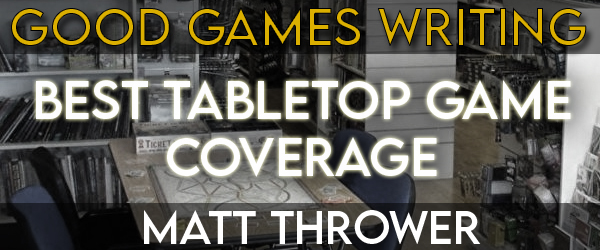
It’s Matt Thrower’s reporting on the struggle for game stores to survive during the pandemic that takes the honours this year. Stories like this need to be captured and patrons and governments alike need to take note of the impacts the coronavirus has had across sectors.
The two UK businesses two had very different experiences of trying to get government support. Switching to mail-order helped Berry avoid needing the furlough scheme for his staff, and he was able to get a grant to cover lost revenue. Jordan contrasts her experience as “an uphill battle carrying a bag of rocks on our shoulders”. The problems stemmed from the change of ownership. “We were not eligible as we were counted as a new business, despite being run by me for four years,” she explains. “Eventually we were able to furlough our small team, which was a massive relief.”
These are the stories that made a difference in 2020 and we hope they stay largely relegated to last year and don’t bleed over too far into 2021.
SPECIAL AWARD: GLOBAL PANDEMIC WRITING
Indeed, so much of games media was consumed by the pandemic, as so much of the world was, that it felt fitting to add a special award recognizing the writing on the pandemic.
Matt Thrower’s piece wasn’t nominated in this category though it would have fit the bill. Mathew Olson steps in here, focusing on the impact of the pandemic on local arcade scenes, an industry that has only recently been revived, often paired with alcohol sales and a party-like atmosphere. Razor-thin margins jeopardize the industry.
Paying the bills is a concern throughout the pandemic: Near where our team works, a number of businesses are relying on government support to pay their rent, a program that will continue until at least June, though its future past then is uncertain. Individuals face similar hurdles, though Alexis Ong reports on how Animal Crossing is helping some players pay those bills.
On the topic of Animal Crossing, this essay from Video Dame embodies so many of the feelings we experienced throughout the pandemic, and our desire for connection through whatever means necessary.
Weddings were victims of the pandemic, as were countless other celebrations like graduations and birthdays, and Aron Garst’s reporting on an in-game marriage and subsequent after-party is both personal and universal.
Dean Takahashi takes a more industry-oriented approach to his pandemic writing, updating us on statistics of player bases for popular online games, investment and VC news, length of play sessions, and more. One small nugget we enjoyed:
On top of that, the percentage of players who became “serious gamers” rose from 63% to 82% during the lockdowns. That is expected to settle at 74% after the lockdowns. That’s a permanent shift of the gaming population to those higher gaming segments.
Sam Greszes has already won an award for his reflection on Ring Fit Adventure’s impact on his wellness. It’s a piece that we believe embodies the sport genre but was uniquely suited for COVID-19, as well, given the shutdown of gyms, and the changing nature of fitness routines around the world.
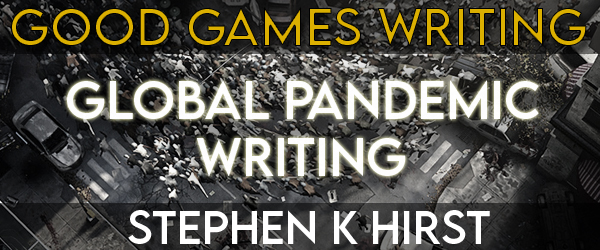
Our winner in this category serves as an on-the-ground view of the pandemic’s effects in South America while bending in personal narratives from a group just trying to get through the pandemic with Mario Kart. The blending of essay and interview serves the piece well and encapsulates our shrunken world that is held together through forces of globalization. Here’s the setup:
Most of the Corona Cup members are in our mid-to-late 30s, and there simply isn’t much time for gaming in our regular day-to-day lives. For many of us, that’s now changed. (I know I’ve logged more gaming hours these past few weeks than I did during the Christmas break of ‘93, when I got a Super Nintendo and Final Fantasy VI.) Almost every day, at least four or five of us will get together for a grand prix or two. Call it one of the small silver linings of a global pandemic.
CURATOR’S CHOICE: MOBILE COVERAGE
Our second Curator’s Choice award–that is, an award chosen exclusively by the team of curators at Good Games Writing–focuses only on mobile gaming and its coverage. So much of mobile coverage is what we’d call service writing, notifying us of in-game updates, and general ongoing coverage. We’re watching service and ongoing coverage attentively throughout 2021 but it was an area we didn’t give as much attention to in 2020.
While most of us game on mobile devices, we don’t see much mainstream coverage of mobile games outside, say, Pokémon Go or (increasingly) Genshin Impact. This is an oversight.
Our curator’s choice piece reflects and reveres the audience for mobile games, weaves in the corona feel of tonight’s awards, and represents mainstream attention that is overdue.
Of course, stickiness isn’t without its concerns. Stickiness is what gets you a Facebook algorithm fine-tuned to deliver outrage. Stickiness is what gets you an Instagram feed that learns what you’re most curious about—and most likely to spend money on—and tickles your consumer G-spot every time you scroll. And for developers, stickiness is a diabolical blend of scarcity and surplus that time and time again pushes you to the Sophie’s choice of free-to-play games: If I want to progress faster, do I part with my money or my time?
So what game could be at the centre of such an article? It’s Marvel Puzzle Quest, a game first released in 2013, and one that receives near-constant updates from the developers. It has a dedicated sub-reddit, a complex language that only the players know, and a daily grind that never feels obnoxious.
It is, like so many other mobile games, seemingly perfectly designed for life in a global pandemic.
